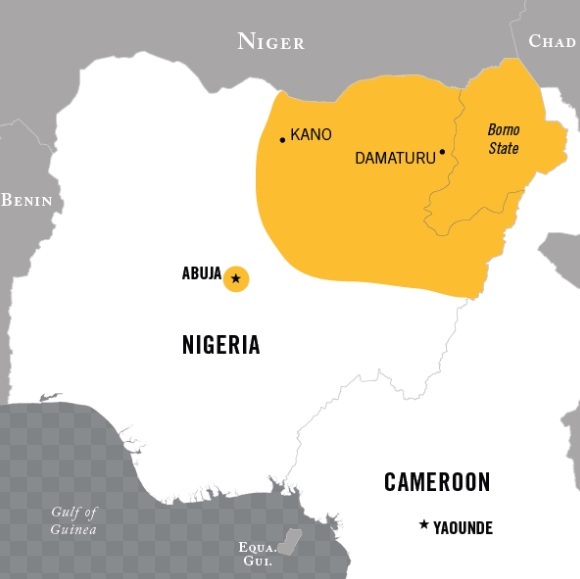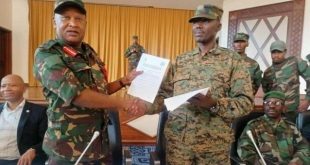
Maiduguri, Nigeria | AFP |
The soldier clutched his book with both hands. He shouted his name, rank and Nigerian Army number to no-one in particular. He stood up straight and ended every reply with a bark of “sah” (sir).
But his eyes were fixed to a slowly cranking ceiling fan in the hospital ward — the thousand yard stare of someone who had seen too much and didn’t want to remember.
The soldier said he was caught up in a Boko Haram ambush and colleagues were killed. A bullet hit him in the leg and he hadn’t seen combat since.
Instead, he saw the inside of beer bottles, the smoke of cannabis joints, then the drug dependency ward of the Federal Neuro-Psychiatric Hospital in Maiduguri.
Nurses said he was violent and abusive when he was admitted, but after a week he calmed down.
“In times of war, when we are fighting war, it’s very good for a man to be a man, to boast that he is a man, to fight the enemy,” he said, trying to explain his state of mind.
“But unfortunately due to the ways of the enemies that come to you or due to the ways you meet the enemy, or due to the way you kill him, (or) you deal with the command…”
His voice trailed off and he apologised. “At times that’s how we fell into (a) battle that we don’t expect in our life… .”
‘Drastic surge’
At least 20,000 people have been killed since the start of the insurgency in 2009 but doctors at the hospital say they’ve treated nearly three times as many for its psychological effects.
That figure is likely to only be the tip of the iceberg: the hospital is the only psychiatric facility in northeast Nigeria — an area bigger than that of the United Kingdom.
In all, 2.6 million people have fled for their lives: many have seen loved ones killed and their homes destroyed. Women and young girls have been kidnapped and raped. Children have been orphaned.
Francis Zamdai, a nurse in charge of the drug dependency ward, said addiction has affected everyone, from government officials and military officers to farmers and the unemployed.
“Before the insurgency… we used to admit sometimes 20, 25 (patients). But with the eruption of the insurgency we used to have 50, 60, above that,” he told AFP.
Consultant psychiatrist Dr Ibrahim Adam Mshelia described the increase in mental health cases since the fighting began as a “drastic surge”.
“Over 58,000 patients have been seen in the hospital that are related to the insurgency,” he said.
“Common causes we see… are post-traumatic stress disorder, depression, substance abuse disorder, psychosis, anxiety disorders like phobia and panic disorder.”
Lifetime effects
The hospital is tucked away behind high walls and iron gates in a quiet housing estate off the Baga Road, whose market has been a frequent target for Boko Haram’s bombs and suicide bombers.
Out-patients wait on rows of benches for consultations; nurses in starched white uniforms — the women in matching hijabs — leaf through paperwork.
A special unit to treat children and teenagers has been opened, backed by the International Organization for Migration, packed with toys, board games and with cartoon characters on the walls.
In-patients sleep or sit silently on their beds in the wards or play pool and table-tennis in the occupational therapy unit.
Treatment and rehabilitation for those affected, however, is likely to be needed long after they have been discharged.
“Even after the end of insurgency the effect… will continue to linger. We are looking to 30 to 50 years,” said Mshelia.
Some 1.5 million people have sought safe haven in Maiduguri. They will eventually leave but doctors fear that those who have managed to cope so far could break down when they return home.
Meanwhile, levels of drug use are said to be rising in Borno state, exacerbated by porous borders, lack of law enforcement and a desperate, damaged population seeking to deaden pain and fear.
They include use of drugs such as cocaine, heroin and methamphetamine, which were previously unheard of in the state, said Mshelia.
Overstretched
The scant provision for mental health services in northeast Nigeria and the scale of the insurgency has left financial and human resources stretched to the limit at the hospital.
Outside, female victims of sexual and psychological violence at the hands of Boko Haram have received some counselling in the camps. But there is agreement more needs to be done for everyone.
UN Secretary-General Ban Ki-moon in May 2015 called on Nigeria to “scale up the provision of medical and psychosocial support”.
For the soldier, a passage in his book is supposed to provide comfort and support for life’s spiritual battle between good and evil, right and wrong.
“Blessed be the Lord my strength, which teacheth my hands to war, and my fingers to fight,” it reads.
But it’s a real-life battle he has struggled to cope with — and wishes had never happened at all.
“I wanted to be with my family, in peace,” he said.
 The Independent Uganda: You get the Truth we Pay the Price
The Independent Uganda: You get the Truth we Pay the Price



